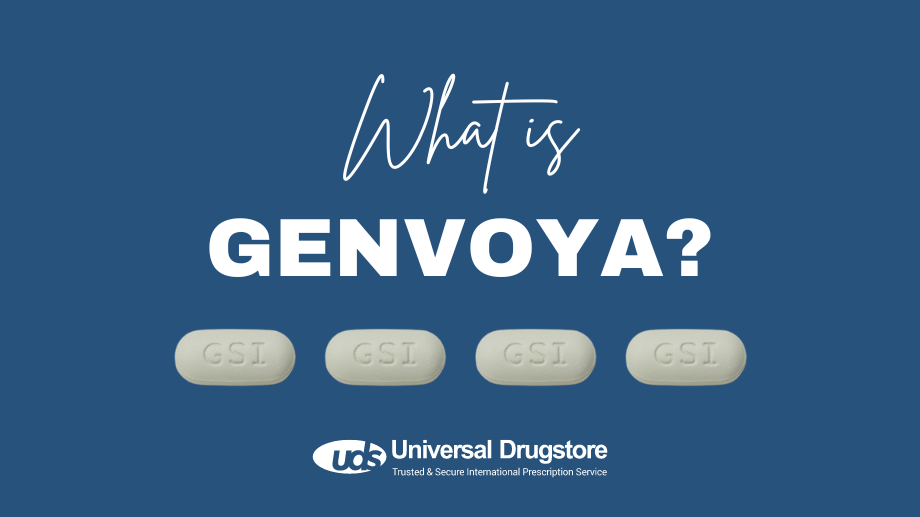What is Genvoya?


Genvoya is a once-daily combination antiretroviral medication used to treat HIV-1 in adults and adolescents aged 12 years and older with a body weight of at least 35 kg. It combines four antiviral drugs into one tablet, elvitegravir, cobicistat, emtricitabine, and tenofovir alafenamide to prevent the HIV virus from further multiplying in your body. Genvoya is manufactured by Gilead Sciences, Inc.
How does Genvoya work?
Genvoya is a combination tablet made up of elvitegravir, cobicistat, emtricitabine, and tenofovir alafenamide. Each drug works to minimize the viral load of the human immunodeficiency virus type 1 (HIV-1) in different ways. Elvitegravir works as an integrase inhibitor, while emtricitabine and tenofovir alafenamide are part of the NRTI class of drugs (nucleoside reverse transcriptase inhibitors). Cobicistat is used to boost the effects of elvitegravir and stops the enzymes that break down antiviral medicines.
The use of Genvoya does not cure HIV infection/AIDS. It is an HIV treatment that is used to reduce the viral load of HIV in the body until it is undetectable (HIV-1 RNA <50 copies/mL). This protects your immune system and helps stop HIV from being passed on to a partner during sex.
What doses of Genvoya are available?
Genvoya comes as a once-daily, film-coated tablet (labeled GSI 510) in a combined dosage of 150 mg elvitegravir (EVG), 150 mg cobicistat (COBI), 200 mg emtricitabine (FTC), and 10 mg tenofovir alafenamide (TAF). A healthcare provider may alter the dosage depending on the patient’s weight.
How do you use Genvoya?
Ensure you follow the treatment regimen given by your healthcare provider and read all prescribing information and FDA-approved product labeling, and the Medication Guide before taking Genvoya.
Genvoya should be taken once daily with food at the same time each day to maximize its effectiveness. If you forget a dose, take your missed dose as soon as you remember unless it is almost time for your next dose. Do not double-dose the medication.
What are the side effects of Genvoya?
The most common side effects of Genvoya in clinical trials compared to placebo include:
-
Nausea
-
Vomiting
-
Dizziness
-
Headache
-
Fatigue
-
Abnormal dreams
-
Weight gain
Rarely, Genvoya may cause some serious side effects, including:
-
High cholesterol
-
Symptoms of liver problems, including:
-
Loss of appetite
-
Dark urine
-
Abdominal pain
-
Yellowing of the skin or eyes (jaundice)
-
Worsening symptoms of Hepatitis B
-
-
Symptoms of lactic acidosis, including:
-
Irregular heart rate
-
Feeling cold
-
Abnormal muscle pain
-
Difficulty breathing
-
-
Symptoms of kidney problems, including:
-
Swelling
-
Fatigue
-
Difficulty breathing
-
Irregular urination
-
-
Symptoms of allergic reaction, including:
-
Rash
-
Itchiness
-
Swollen lymph nodes
-
Contact your healthcare professional for medical advice about any possible adverse effects you experience while taking Genvoya. You can report your adverse effects to the FDA at 1-800-FDA-1088 or www.fda.gov/medwatch.
Genvoya drug interactions
When Genvoya is taken with other prescription drugs, over-the-counter medications, vitamins, and supplements, it may change how they work or increase the frequency or severity of side effects. Some drug interactions with Genvoya include:
-
Alfuzosin
-
Dihydroergotamine
-
Ergotamine
-
Lovastatin
-
Simvastatin
-
Lomitapide
-
Pimozide
-
Lurasidone
-
Sildenafil
-
Midazolam
-
Triazolam
-
Carbamazepine
-
Phenobarbital
-
Phenytoin
-
Lamivudine
-
Ritonavir
-
Rifampin
-
St John's wort
-
Vitamins containing calcium or magnesium
Boxed warnings
Severe acute exacerbations of hepatitis B have been reported in patients who have both HBV and HIV-1 and have stopped taking medications containing emtricitabine and/or tenofovir disoproxil fumarate (TDF). This may also occur with the discontinuation of Genvoya. Liver function should be monitored closely in these patients and anti-hepatitis B therapy started if appropriate.
Genvoya precautions
You should be sure that your healthcare provider is aware of all your medical conditions, including if you have:
-
Hepatitis B virus or other liver problems
-
Kidney disease or other kidney problems
-
Allergies to elvitegravir, cobicistat, emtricitabine or tenofovir alafenamide
-
Are taking antacids or similar medications
-
Are taking medications for HBV infection
-
Are taking medications for erectile dysfunction or pulmonary arterial hypertension
-
Are taking antipsychotics
-
Are pregnant or planning to become pregnant
-
Are breastfeeding or plan to breastfeed (Genvoya may affect breastmilk)
-
Are on dialysis
Is there a generic available for Genvoya?
No, currently there is no generic available for Genvoya in the US.
How do you store Genvoya?
Ensure you store Genvoya in its original packaging at room temperature between 68 to 77°F (20 to 25°C) and away from moisture. Keep out of reach of pets and children. Dispose of tablets safely once you stop taking Genvoya or the medication is expired.
Related medications
-
Descovy (emtricitabine/tenofovir alafenamide fumarate)
-
Truvada (emtricitabine/tenofovir disoproxil fumarate)
-
Biktarvy (bictegravir/emtricitabine/tenofovir alafenamide)
-
Stribild (elvitegravir/cobicistat/emtricitabine/tenofovir disoproxil fumarate)
Sources
Drugs.com https://www.drugs.com/genvoya.html#before-taking
Aidsmap https://www.aidsmap.com/about-hiv/arv-factsheet/genvoya


